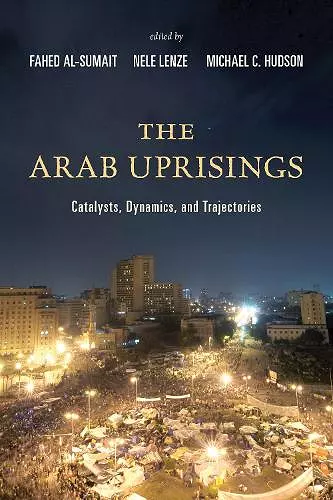The Arab Uprisings
Catalysts, Dynamics, and Trajectories
Michael C Hudson editor Nele Lenze editor Fahed Al-Sumait editor
Format:Hardback
Publisher:Rowman & Littlefield
Published:29th Oct '14
Currently unavailable, and unfortunately no date known when it will be back
This hardback is available in another edition too:
- Paperback£45.00(9781442239012)

The uprisings of 2011 have radically altered the political, economic, and social landscapes of the Middle East and North Africa. A clearer view of the recent past now provides greater perspectives on the causes and the consequences of these events. This collection of essays challenges the common tendency of applying the dominant frame of “Arab Spring” to explain contemporary politics of the Middle East. Numerous debates about the utility of the “Arab Spring” metaphor already exist, contesting such issues as its foreign origins or its temporal and optimistic implications. It further has the negative and significant side effect of implying a singularity to these events in a manner that often defies the varied conditions on the ground. This is why the term “Arab Uprisings” is used here as the organizing frame to address numerous socio-cultural, economic, political, experiential, and communicative aspects of the uprisings. This text is organized around three themes: origins, experiences, and trajectories. The first section addresses catalyzing factors that help explain the emergence of the uprisings from various political, economic, and socio-cultural perspectives. The second section examines the functions and responses of diverse people, institutions, and ideologies during the initial years of the uprisings. It includes an in-depth case study on women’s changing political situation in the catalyzing country of Tunisia, as well as discussions about the roles of political Islam, new mass media, and social networks in these rapidly changing contexts. The third section discusses cross-national implications and the multitude of repercussion the uprisings are having on the global system. Using an interdisciplinary approach with contrasting theoretical and methodological orientations, the global experts who contributed the chapters explore various theoretical approaches, juxtaposing them with comparative surveys and in-depth case studies. They show that after the initial euphoria (or dread) that surrounded the uprisings, a transitional and transformative period in the Middle East has come that requires thorough observation and analysis.
The contributors to this excellent volume treat the tumultuous politics of the contemporary Arab world in exactly the way it should be treated: from multi-disciplinary perspectives and with a ‘long view’ that minimizes the dangers of instant analysis based on current events. Rejecting monocausal explanations, this theoretically-rich collection illustrates the value of adopting a variety of analytical approaches to catalysts, dynamics and political trajectories alike. It is strongly recommended to anyone wishing to gain greater insight into the region and where it might be headed. -- Rex Brynen, Department of Political Science, McGill University
The Arab uprisings have not generated a linear process of transition to democracy. Much strife and uncertainty remain, as the authors show. After reading this book, however, nobody will doubt that the changes taking place are profound and irreversible, and that the Arab world will never be the same. -- Marina Ottaway, the Woodrow Wilson Center
ISBN: 9781442239005
Dimensions: 235mm x 161mm x 28mm
Weight: 603g
322 pages